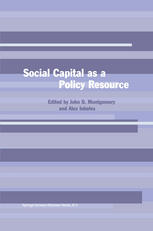

Most ebook files are in PDF format, so you can easily read them using various software such as Foxit Reader or directly on the Google Chrome browser.
Some ebook files are released by publishers in other formats such as .awz, .mobi, .epub, .fb2, etc. You may need to install specific software to read these formats on mobile/PC, such as Calibre.
Please read the tutorial at this link: https://ebookbell.com/faq
We offer FREE conversion to the popular formats you request; however, this may take some time. Therefore, right after payment, please email us, and we will try to provide the service as quickly as possible.
For some exceptional file formats or broken links (if any), please refrain from opening any disputes. Instead, email us first, and we will try to assist within a maximum of 6 hours.
EbookBell Team

4.8
104 reviews`Few terms can match social capital's achievement of facilitating dialogue across sectors, regions, and disciplines. While maintaining a critical sensibility, these essays showcase the versatility, rigor, and usefulness of social capital scholarship at its best.'
Michael Woolcock - World Bank
`How may the connectedness among human beings help to advance important collective goals? This comprehensive book examines the sources of social capital in ethnic, religious, residential, occupational and other affinities. More importantly, it assesses how social capital influences such diverse endeavors as transnational entrepreneurship, the performance of high school students, the workings of labor markets and the efficacy of labor and peasant unions, and the outcomes of World Bank projects, among other topics. The book's reach across East Asia and beyond, and its focus on empirical case research, makes it a splendid fountain of comparative information and analysis on one of the key scholarly and practical topics of our time.'
Jorge Dominguez - Harvard University
`Rarely is a collection as timely or as useful. Anyone concerned with setting policy will find extraordinarily interesting this insightful treatment of a subject which is giving many of us considerable trouble. Here are enough new ideas to spark a dozen doctoral theses and a gross of journal articles.'
Paul Rich - Professor of International Relations and HistoryUniversity of the Americas,Fellow, Hoover Institution, StanfordUniversity
`This important collection of papers examines how social capital has been used to advance social policies - or alternatively, how social capital has complicated the implementation of social policies &endash; in nations on both sides of the Pacific. The cases range from India's Andaman Islands and Russia in Asia to the Andes, and prominently include China, Japan, and Southeast Asia along the way. They are based on first-hand field research in the areas, and serve as the platform for important synthesizing articles by the editors. This book extends our understanding of the increasingly important concept of social capital, and is a contribution to theory as well as to our knowledge of policy processes in the nations of the Pacific.'
Nathan Glazer - Professor of Sociology and Education, Emeritus,Harvard University
`Montgomery and Inkeles compile a unique and comprehensive overview of the uses of social capital as a policy resource. The remarkable breadth of studies of social capital in Pacific Basin countries and of its manifestations in ethnic groups, labor unions, entrepreneurial ventures, educational institutions, micro-finance organizations, rural federations, NGOs, and religious groups provide new perspectives on its crucial roles in economic, social, and political development. The editors and authors of this fascinating collection of studies offer convincing arguments that social capital may, indeed, be the real wealth of nations. Students of the social sciences and the policy sciences alike will benefit from the encyclopedic coverage of how social capital contributes to public policy and human dignity around the world. The volume can give policymakers new insights into ways of building social capital and enhancing its use for social progress and will provide scholars a strong foundation for research on social capital for years to come.'
Dennis A. Rondinelli - Glaxo Distinguished International Professor ofManagement, University of North Carolina at Chapel Hill